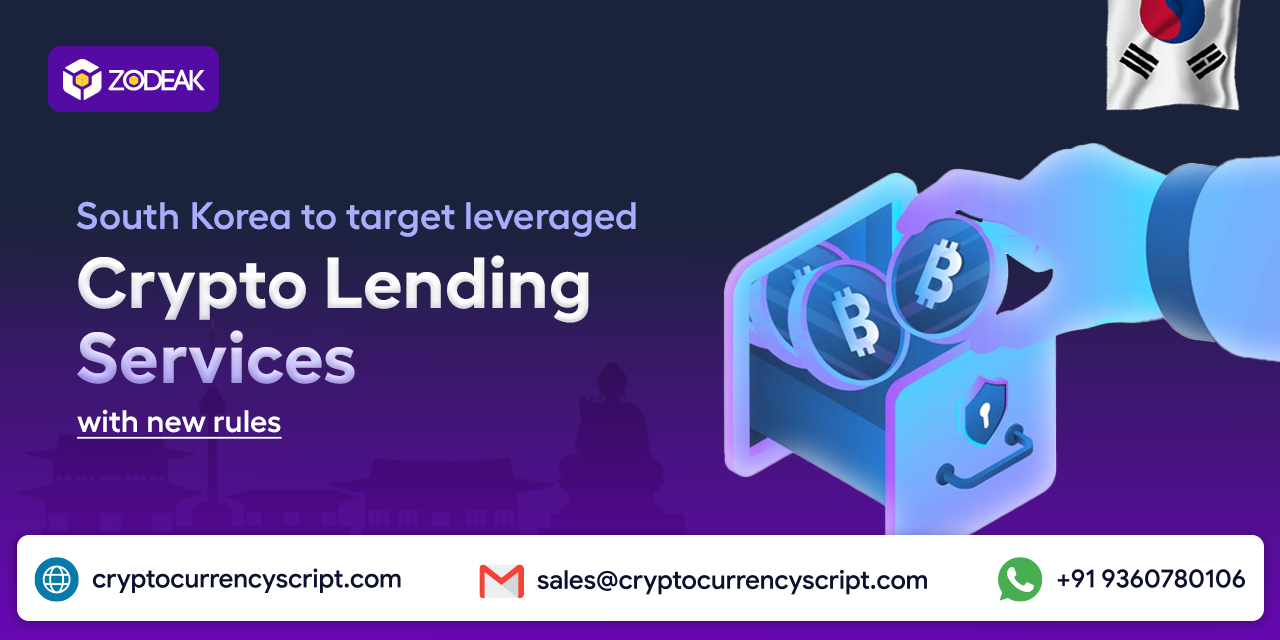Hey investors! The crypto rules are shifting fast in South Korea, and crypto lending services may be the first to feel the heat. Regulators have recently rolled out new guidelines that could alter the way crypto lending platforms work and affect whether yours can survive in the market.
If you’re thinking about investing in or have already launched your crypto trading platforms in South Korea, then this is for you!
Read till the end to uncover how South Korea’s financial authorities are teaming up with leading cryptocurrency exchanges to set up crypto lending standards by August 2025, what those rules consist of, and what it means for you.
South Korean Rules for Crypto Lending Services
The Virtual Asset User Protection Act covers:
#1. Protecting Users from Crypto Lending Risks
- Crypto exchanges are now required to keep at least 80% of their users’ assets in cold storage.
- User funds must be separated from the firm’s funds, ensuring that customer assets are not used for business operations.
- Crypto lending platforms are mandated to either secure insurance or maintain a reserve fund to compensate users in the event of a hack or system failure.
- Real-time monitoring systems should be placed to identify and report any suspicious or unusual transactions to financial authorities.
#2. Tightening Rules on Risky Crypto Lending
- Financial Services Commission (FSC) and Financial Supervisory Service (FSS) have pushed big exchanges like Bithumb to reduce maximum leverage options from 4X to 2X.
- To help combat money laundering, traders are required to connect their real bank account names with exchanges.
#3. Enforcing Transparency for Safer Crypto Deals
- With the security concerns about stablecoin lending, Upbit has terminated its USDT lending services.
- Failure to comply with the rules may result in facing criminal charges and fines. Crypto lending platforms can get “blocked” and “expelled” if deemed non-compliant by regulators.
What’s Driving Crypto Lending Service Growth in South Korea?
Did you know? Over 25% of South Koreans between 20 and 50 years old now consider crypto an essential part of their financial portfolio. With rising economic pressures and a competitive financial environment, many are exploring margin trading and other leveraged methods to increase their wealth more quickly.
South Korean Traders’ passion for crypto or crypto trading didn’t occur overnight; in fact, it was first rooted in 2017, with the Kimchi Premium.
- Kimchi Premium: Refers to when the price of Bitcoins and altcoins was higher in South Korean exchanges than on other global crypto exchanges. All caused by high demand, regulations, and market limitations.
And in South Korea,
Four Key Reasons Fuel the High-Leverage Crypto Lending Platforms
#1. Economic Pressures & Opportunity Seeking
Young Koreans often feel burdened since traditional careers and savings may not be enough to meet their ambitions of marriage, housing, and forming a family.
For them, the high-risk and high-reward world of crypto leverage platforms might seem like the best choice.
#2. The Ppalli-Ppalli Culture
“Ppalli Ppalli,” which means “hurry, hurry” in Korean, perfectly captures the South Korean mindset of racing through tasks. This rush is a significant part of culture, rooted in the country’s post-war drive to progress quickly, and focuses on getting the work done fast and efficiently.
High leverage trading aligns perfectly with this attitude, allowing for quick returns in a short period.
#3. Digitally Connected Investor Networks
South Korea is undeniably one of the most connected countries in the world. Its active online forums and chat rooms have made it easy for traders to build a strong community where traders share strategies and market predictions.
This competitive and collective leverage trading experience has also been a major surge for crypto lending services
#4. Simple Entry into Crypto Markets
With world-class internet infrastructure and a well-developed fintech industry, the entry point for crypto trading is perfectly positioned. Given that everyone has access to smartphones, accessing crypto and trading has never been simpler for South Korean traders.
Why Crypto Lending Platforms Are Under Regulatory Pressure in South Korea
Imagine yourself as a 28-year-old living in South Korea. One day, your friend shares his success with crypto, explaining how he quadrupled his investment using leverage. Intrigued, you join the crypto lending platform and follow his lead. Lacking any previous experience, you choose to start small.
You make a little profit here and there, slowly raising your stakes and watching those earnings grow. Then, in a moment of impulsiveness, you decide to go all in, and just like that, you lose… You lose everything.
That’d be pretty painful, wouldn’t it? which is exactly why the South Korean government is stepping in.
When finding stable jobs becomes hard, real estate is unaffordable, and traditional investments can seem inaccessible. High-risk trading can start to look like one of the last few options left to build significant wealth.
But when a large group of people engages in this level of risk, it can spark sudden volatility that shakes the entire market.
Why This Is a Wake-Up Call: Crypto Lending Platform Investors Take Note
If you’re considering investing in crypto lending services, here are three important factors to remember.
#1. Compliance Challenges Are on the Rise
With crypto regulations continually evolving, cold storage and multi-factor authentication have become increasingly standard. You need more. With officials having the power to freeze your operation, your platform needs to be agile and compliant to survive.
#2. Time to Redesign the Product
Look out for new rules coming your way about leverage and risk management. To get it right, you need to incorporate margin limits, user account type, and clear risk awareness lessons.
By offering clear onboarding and how-to-do guides, you can build trust, safeguarding both your users and platform.
#3. Market Instability and Collateral Risk
In the crypto market, profit and disaster come hand in hand. The sudden swings in crypto price can drop the value of collateral, triggering margin calls or forced liquidation.
Failing to do so could not only damage your financial standing but also put your long-term success on shaky ground.
New Rules in Korea, New Game for Everyone Else
South Korea has taken a significant step by passing the Virtual Asset User Protection Act on July 18, 2023. The law officially took effect on July 19, 2024.
Now in 2025, with active monitoring underway and the regulations in full swing, attention is turning to newly emerging risks, especially in crypto lending services.
As other countries observe, it seems that Korea’s approach may reveal that K-culture is not the only impactful trend emerging from the region. Their innovative balance of consumer safety could set a significant standard for other markets.
Conclusion: So, Are You All Set to Start Your Crypto Lending Platforms In South Korea?
South Korea’s recently introduced rules for crypto lending platforms go beyond mere local regulations. They serve as a crucial test case for the industry’s approach to risk management, user protection, and overall maturity.
If you’re investing in crypto lending platforms or planning to launch one, it’s not only the right crypto leverage platform development partner you need; it’s getting early with compliance that gets you the win.
Don’t delay any longer! Offer your users the best and most secure crypto leverage experience, and set the industry standard.
Here’s to progress, Korean style. Hwaiting!
If this blog helped you understand why South Koreans embrace speed, feel free to share it and spread the insight.





